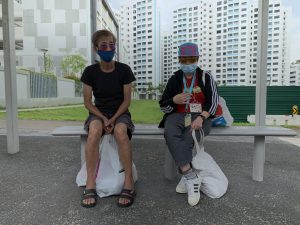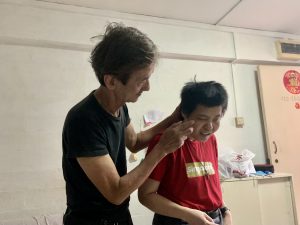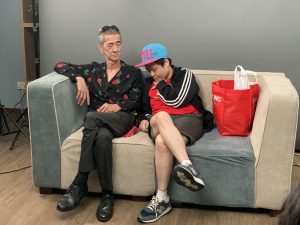Dressed in black from head to toe, with dark shades covering his eyes and a black ear piece, almost inconspicuously, placed in this ears, he may appear menacing.
The lead character from a new Men in Black sequel or a local spin-off of Vincenzo? Neither.
Meet Henry, the father of a 28-year-old autistic resident at St. Andrew’s Adult Home (Sengkang) [SAAH].
 The Diagnosis
The Diagnosis
“Your daughter acts weirdly. She does not get along with her peers and has a weird temperament.” This was something he had heard about his daughter Stella umpteen times.
When she was expelled from school after completing Primary 1, Henry arranged for Stella to be assessed. She was diagnosed with autism. As a result of this, and with assistance from a social worker from the neighbourhood Family Service Centre, Stella was placed in a special needs school to continue her education.
The Beginnings
The challenges for Henry’s family began several years earlier. Shortly after his wife had given birth to Stella, she was retrenched and stayed at home. Henry began to notice changes in his spouse. She would mumble and laugh to herself, and she watched TV all day long. She was no longer herself. “She was diagnosed with schizophrenia, and had to be admitted to the Institute of Mental Health (IMH),” Henry explained.
 As the sole caregiver and breadwinner, he had to pay the bills, and care for his wife, son and Stella, the youngest child. All of them depended on him, especially Stella who suffered from epileptic fits from time to time, and was hospitalised frequently.
As the sole caregiver and breadwinner, he had to pay the bills, and care for his wife, son and Stella, the youngest child. All of them depended on him, especially Stella who suffered from epileptic fits from time to time, and was hospitalised frequently.
Henry was unable to care for all of them in person while also trying to earn a regular income. He had little choice but to place Stella and her brother in a residential home for children and youths, while taking care of his wife, who was back home after a stint at IMH, and working part-time. When possible, he brought his children home for home visits and cared for them in person as well.
However, after his wife’s condition deteriorated and it was clear that she was not able to care for herself, she was admitted to IMH for a long-term stint, and remained at IMH till she passed away a few years ago.
A Pillar of Strength
While she was still alive, Henry often had to juggle his time, visiting his wife in IMH, and Stella at the home, and then returning home to care for his son, who was on an extended home visit – all while still working to support the entire family. Despite the challenges, he did not bow to his circumstances or concede defeat. He continued to stay strong for his family.
The Present
With Stella at SAAH since 2019 and his son having moved out many years ago, Henry stays alone in his flat. However, the memories of times spent with his wife, son and daughter, as well as the handicrafts Stella leaves at home each time when she’s back for home leave help fill the void in his heart. Every so often, Stella calls and keeps him abreast of happenings in her life. “I miss you Papa. I want you to visit,” shared Henry of his daughter’s pining for her father.
“There are times she’ll pester to video call, so that she can look around the home, and see what I am doing. Sometimes, she calls me when I am in the toilet. How to pick up her call like this?” said Henry with an exasperated laugh.
To Henry, whose livelihood as a dishwasher has been affected due to the pandemic, “Whatever happens, life still has to go on. I still have to care for Stella. I cannot possibly put her aside and do nothing.” Henry added, “We gave her life, so it is our responsibility to provide the care she needs.”
“I eat bread as much as possible. Nowadays, I have to think twice about lighting up a cigarette or picking up a can of booze. But, I will continue to pay the bills,” said the selfless father. Thankfully, the social worker at SAAH has been keeping a close lookout for Henry, and has been in regular contact with him to address his issues and concerns.
The Future
 The future is not clear. On several occasions, Stella has directed her spittle at others’ faces when extremely unhappy. “I hope she can go out to work and earn money. But, what would happen? Would she spit and fight with others? When will she act up again?”, Henry sighed, unsure of how society will accept someone with moderate to severe autism, trying to eke out a living outside of a sheltered, autism-friendly environment.
The future is not clear. On several occasions, Stella has directed her spittle at others’ faces when extremely unhappy. “I hope she can go out to work and earn money. But, what would happen? Would she spit and fight with others? When will she act up again?”, Henry sighed, unsure of how society will accept someone with moderate to severe autism, trying to eke out a living outside of a sheltered, autism-friendly environment.
“One of her challenges is her repetition of demands. When she wants it, she wants it now,” said Henry. He gave a recently example of how Stella repeatedly asked the same question about home leave despite being assured that she could go for home leave the following week. “You cannot promise her [without fulfilling the promise]. She will remember it and ask for it constantly,” he added.
Henry’s wish for Stella to go out to work is simple. “I want her to be independent and pass time meaningfully, so that she will not disturb others and pester me all the time for money,” he said.
In spite of the difficulties Stella faces, Henry trusts that Stella is in good hands, and will be able to manage her behaviours one day under the care of the staff at SAAH.
A Lesson from Henry’s Family
Henry’s story leaves us with food for thought. While family circumstances dictated the need for his wife and daughter to live away from the family home for extended periods of time, Henry persevered to be a pillar of strength for his entire family.
Over the last year and a half, COVID-19 has affected how much time most parents spend at home with their children. However, the norm in Singapore over the last couple of decades is for most fathers, and indeed mothers, to spend long hours in the office, leaving little time, energy or patience for their children when they’re home. Even as Singapore moves forward with reopening, as the percentage of vaccinated individuals increases, it might be a good time for all of us to stop and consider how best to allocate ourselves and our time, to be productive without inadvertently having a negative impact on the family members.






